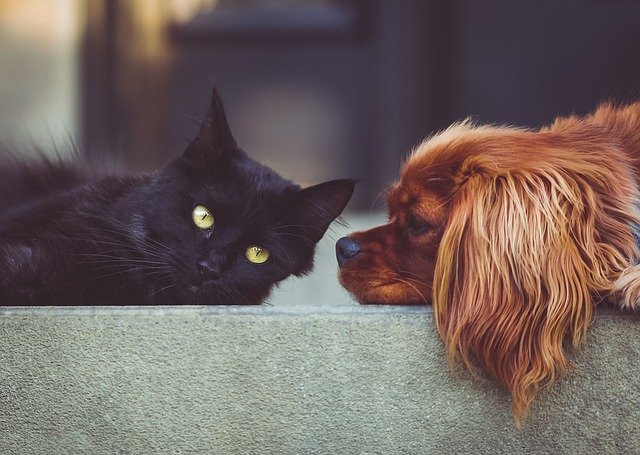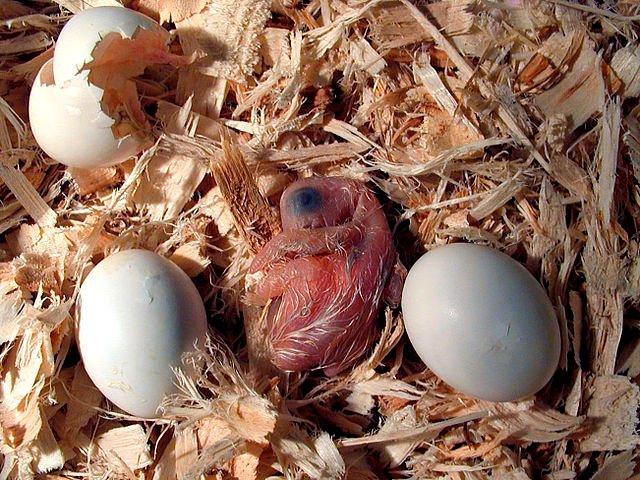Yeah, the little birdie we have always dreamt of, is finally coming home. But just like any new parent, we don’t know how to raise our bird, what he’ll expect from us and what we should be doing to keep him happy.
But to decide on all this, you need to know which bird you are adding to your family. The most petted birds, undoubtedly, are parrots. But the parrot family has around 400 species. That said, only a few of them are kept as pets around the world.
Other species have been better living in the wild only. A decision about which parrot species to bring home should be taken after considering a few factors beforehand. Here are a few things which are a must so that
you and your little birdie could bond well and neither is unhappy.
Choosing the right bird pet
Before selecting a bird to pet, take your time to think about what you want from your pet. They are wild birds by nature and are not used to our habitats and hence will test your patience.
Some will demand extra attention, others will be talkative enough to the point of being unpleasant. Few tend to bite a lot and some can be fussy. So here are some factors you need to consider before buying a pet bird.
Cost of purchase and living
This is the first thing that needs to be considered as managing the cost of buying your bird is one thing but ultimately not giving him the proper quality of life could be threatening for him. Apart from the initial cost of bringing home and getting the cage for your bird, he needs to be fed a proper diet to be healthy. However inexpensive bird you bring home, regular visits to the vet to get him checked for any health issues is a necessity. To raise a bird, you have to have a dedicated
budget.
Size of the bird
Size matters. You won’t be able to raise a Macaw in an apartment as they are too big for closed spaces, need a huge cage, and should be let out daily for flying to be happy. So, always see the housing requirements, dietary needs and behavioral patterns of the bird you are bringing home. You won’t be able to keep a noisy bird in an apartment setting. A quiet and small-sized bird, like Senegal, would be an apartment choice then.
Temperament and behavior of the bird
Knowing the temperament of the bird you are bringing home is a prerequisite to bond with your bird. If you want a companion bird, Cockatiels are a good choice.
Say, if you would love a cuddly bird, a Conure should be your choice as they are called the cuddle bugs. A talkative bird need would be fulfilled by African Grey Parrots but they are a bit reserved sometimes. A Quaker will talk to you and your family a lot and keep you entertained.
Time commitment
Raising a pet would just need the amount of your time a baby needs. Only the time duration varies. Birds like Canaries or Finches would be a great choice if you are unable to commit much of your time. Whereas, a Macaw is known to be very needy and will become very destructive if ignored.
Also, raising a pet is a lifelong commitment. Many birds have been known to outlive their owners as they can have a lifespan of more than 50-60 years. So, a bird might be with you all your life through. See if you are ready to commit to them your time daily, all these years.
Dietary needs and maintenance
The fulfillment of the dietary needs of a bird is what decides their health status. A bird needs a special diet to be fed. Say, Canaries are happy and healthy to be fed on pellets with just little of fresh fruits and green vegetables.
And then comes the maintenance part. The hygiene requirements of the bird form a large part of it. If you are ready for a high maintenance bird, go for an African Grey Parrot or a Macaw. But if you are not competent enough for those grooming sessions and find them difficult, a Budgie is a great choice as they have been known to be the cleanest pet bird out there.
If you are a first-time bird owner
Having petted a bird before will always be a learning experience, even if you are selecting a different species this time. Large birds like Macaw are not a great choice for first-time parents as they need a lot of care and attention. Budgies or Lovebirds are a great choice to start learning to pet a bird and keeping them happy.
Quaker Parrot vs Other Birds
If you are confused between buying a Quaker parrot and some other species of parrot, this detailed guide will help you decide better in taking the right decision.
Quaker parrot vs Cockatiel
Quakers are less social than Cockatiels and tend to get attached to a single person emotionally. They prefer to play alone or with their favorite person usually.
Cockatiels, however, enjoy spending time with a variety of people rather than focussing all their attention on one person. Because of this reason, they are suitable for people looking to buy a bird for interaction with a bunch of people.
Quakers, on the contrary, are custom-made for you if you are looking for a companion for yourself. Once you tame your Quaker, he will consider you over everyone else.
Cockatiels respond better to training due to their inherent super-friendly behavior. Quakers display territorial behavior with their cage and belongings while Cockatiels don’t.
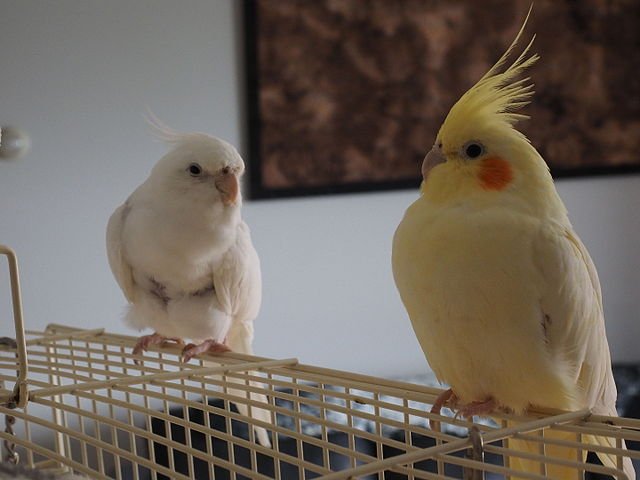
Talking about their vocal abilities, Quakers tend to be louder than
Cockatiels and can chatter all day long. So, prefer to pet a quieter bird if you have sensitive neighbors.
Quaker parrot vs African Grey
African Greys are bigger and are more expensive than Quakers. It is difficult to maintain them due to their relatively large size. But, they are preferred over Quakers because of their excellent talking abilities.
They are also dubbed as ‘the Einstein of the bird world’ due to their unmatched intelligence.
Quaker parrots tend to be more flexible to change in general. They accept new people and things better. Whereas, African Greys get extremely stressed with the introduction of new people in their lives. Also, Quakers are more social than Greys.
They are cheerful personalities and love you as much as you love them. On the contrary, African Greys like to spend their time alone and do not gel well with people. They care for you but do not love you as much as you love them, so they are more aloof.

If you or any of your family members have allergies, do not consider buying African Grey parrot. He produces dust which can negatively impact the health of an allergic person.
If you are on the lookout for a quieter bird, African Grey would be your best bet, but if you are looking for a good friend who spends most of his time with you, you must go for a Quaker.
Quaker vs Budgie
Budgies are much smaller in size than the Quakers. This makes it difficult to cuddle them. They are much quieter than Quaker parrots and extremely well mannered. Budgies have the capability to chatter endlessly but the sounds are not usually loud. This makes them more suitable for apartment living compared to louder Quaker.
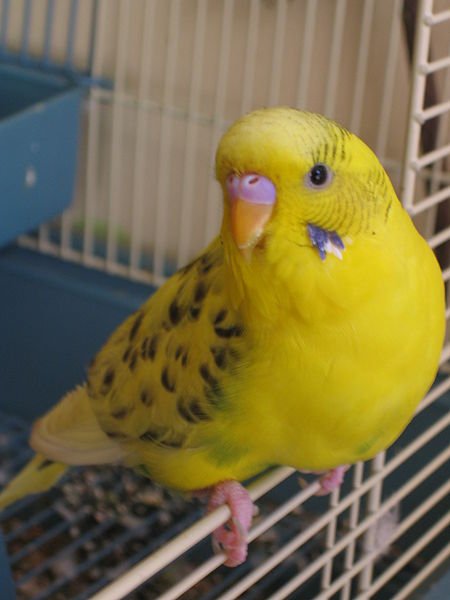
Budgies can be a little messier as they don’t use their feet to eat food. This results in more scattering of food. But since they are very little, it is quite easy to handle them. Due to their inherent good behavior, they can be easily tamed. They also don’t bite as hard as Quakers. So, for those of you who are considering to bring a bird home for the very first time, Budgies are a great option.
More about Budgie Care here.
Quaker vs Cockatoo
Cockatoo is extremely bigger than Quaker parrot. There are different types of Cockatoo species and even the smallest one is of the size of the biggest Quaker. They are also much more expensive than little Quakers.
Cockatoos display extreme dominant behavior and can pose problems to their owners. They are difficult to tame and tend to show biting behavior. So, they are not suitable for first-time bird owners.

It is recommended not to share the cage of Cockatoos with any other bird as they become very jealous of their cage-mates over time. Keeping a bird with your cockatoo might mean a death sentence for the other being. With a biting force of 700 to 750 lbs per square inch, a Cockatoo can kill another bird in less than a blink of an eye.
Quaker vs Conures
Quaker parrots are a bit bigger than Conures making them a little heavier.
Although there is a difference in their size and weight, they are placed in the same size group. They require the same size of cage, cage accessories, and food for their living.
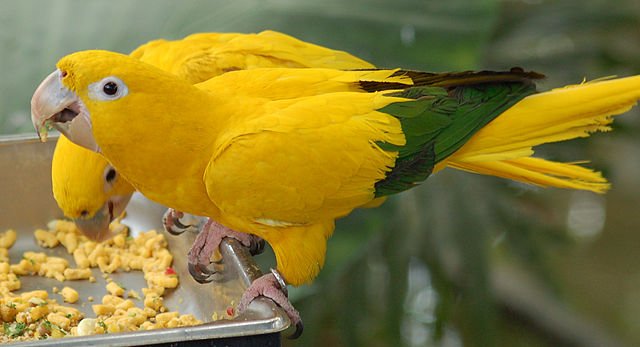
Both the species make a great companion as they are famous for their friendliness. Conures are called as ‘cuddle bugs’ by many people as they love to snuggle their owners. Quaker parrots are also cuddle-buddies as they develop a unique bond with their owners and want to spend their entire time with their favorite person.
Conures are louder than the Quakers. The voice of Conures is extremely garbled and scratchy, so it is difficult to apprehend the correct meaning of their sounds. On the contrary, Quakers can mimic sounds properly and can also speak clearly, depending on the voice-training you have provided them. Quakers tend to build large vocabulary, unlike Conures.
Quaker vs Macaw
The Macaw species carries a huge variety of birds ranging from huge Hyacinth at 100 cm to little Noble Macaw carrying size of 30 cm. Quaker parrots do not have any such varieties.
There are many varieties of Macaws that require abundant space for a house. Whereas Quakers, being little, do not demand that much of a room.
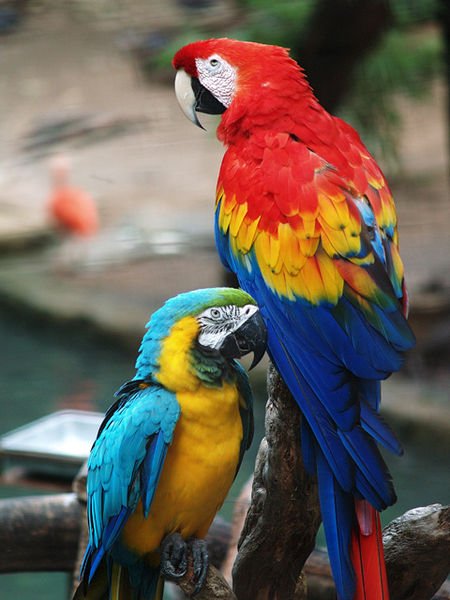
Macaws, whether large or little, develop very loud vocalization. Quakers are nowhere near such loud noise. Moreover, their vocabulary building skills are not as great as that of little Quakers. They cannot even mimic sounds properly. Because of this reason, their loud sounds might not translate to anything and this noise can become irritating for their owners.
As the breeding of Macaws requires more effort on the part of aviary owners, they are generally more expensive than Quaker parrots. Macaws are very strong and can be destructive, contrary to the Quakers who are small and friendly.
Keeping in mind the size and behavioral patterns of Macaws, Quakers are suitable for home environmental while Macaws are best kept in aviaries.
Quaker v/s Senegal Parrot
Quaker parrots tend to be louder than the Poicephalus and possess a distinctive tone. Along with being quiet, Poicephalus are well-mannered. They are also easy to handle and tame. They are more likely to respond well to your training due to their inherent good nature.

Quakers, on the other hand, are mischievous beings and might be difficult to handle for some owners. Many subspecies of Poicephalus including Senegal, Red-bellied, Jardine’s, and Brown-headed is as good talkers as Quaker parrot species. You can train them to learn a few words, phrases, and songs.
Though Quakers are considered aggressive, Poicephalus generally possess an even temperament.
Quaker vs Amazon Parrot
Amazon parrot species range from medium to large size and can be much larger than Quaker parrot. They cost much more than Quakers. They are extremely strong personalities displaying playful and outgoing behavior.
Some of the Amazon parrot subspecies are quieter than Quakers like Red-lored, Lilac-crowned, and White-fronted. While others including Orange-winged, Yellow-crowned, Mexican red-headed, Blue-fronted, and Mealy tend to display the same noise levels as Quaker parrots.
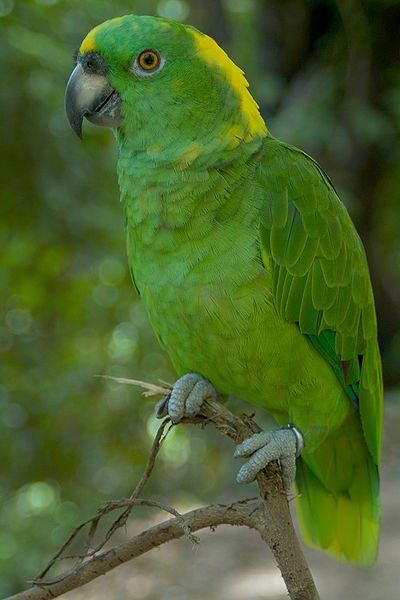
Many people prefer Amazons due to their intelligence and excellent talking abilities. But only a few know that not all Amazons are adept in building a
vocabulary. Lilac-crowned, Red-lored, and White-fronted are very poor in picking up words and phrases. Orange-winged is as good as a Quaker in his verbal skills.
Blue-fronted, Mexican red-headed, Yellow-crowned, Yellow-naped, Mealy, and Dbl Yellow-headed shows outstanding conversational skills. Many of these can sing very well, but that varies from individual to individual.
Quaker v/s Pionus Parrot
Just like Quaker parrots, Pionus is a single-person species. After developing a good bond with you, they will try to protect you from other people. They are much quieter than Quakers and even when they chatter, their sounds are very low.
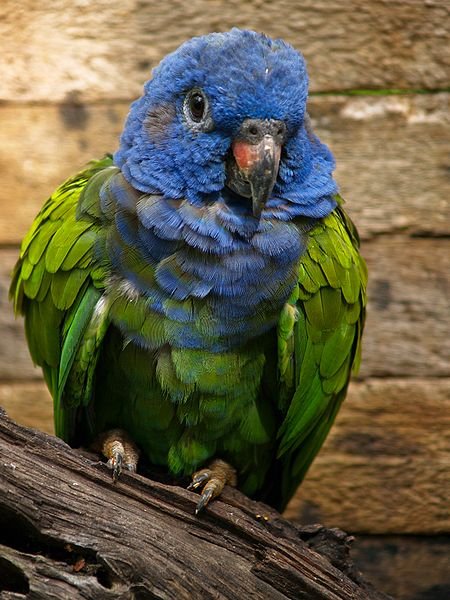
Quakers demand more time and attention and might start biting you if you do not fulfill their social needs. Pionus, however, are not aggressive beings and do not bite as much as Quakers. If you are considering to buy a bird in your apartment set-up, you shall prefer Pionus over Quakers.
Quaker vs Lovebirds
Both Quakers and Lovebirds are small creatures that make them easy to cuddle, handle and care for. Just like Quakers, Lovebirds also come in a wide variety of colors. This gives you abundant options to choose the color of your choice.
They are territorial in a unique manner. While Quakers tend to protect their living space and belongings, Lovebirds become possessive for their cage-mate when kept in pairs.
Quakers are louder than Lovebirds and have the potential to talk endlessly with you. This takes us to the talking abilities of both the birds. Quakers will be able to pick words up very quickly while the little Lovebirds are slow in learning.
Lovebirds tend to be quiet and, therefore, can easily adjust in an apartment set-up too. But if you are interested to teach your bird words, phrases, and songs; you should not look beyond Quaker parrots.
Quaker vs Caiques
Caiques are more playful and vibrant species than Quaker parrots. Due to their abundant energy levels, they require more space and play area. They love to roll all over the floor of their cage and might get aggressive when interrupted. They are as territorial as Quakers and are infamous for giving the ‘worst bird bite’ out of all the parrot species.
Quakers are louder than Caiques and can chatter endlessly, unlike Caiques. They possess much better verbal skills than Caiques.
Caiques tend to behave better when kept in pairs. You can consider buying a white-bellied and a black-capped for making a pair, it would not pose any problems.
Before bringing a pet home, we all visit our neighborhood pet shop ‘just to see the options’. And then we bring a bird home simply because he looked beautiful. But the decision of adding a bird pet to your family needs a lot of research. You need to be mentally prepared beforehand to have him at home to form a close bond.
Bringing a life home shouldn’t be done on an impulse. More so, it needs extra thoughtfulness if he’s from a different habitat. Be prepared to do everything to make him happy. Do your best to keep him at his best. But for all that, you must know if you’ll be able to provide him what he needs. So, plan your bird the way you plan your baby. Always!
Everything you need to know about your Quaker parrot.
Most of the photos in the article are from http://wikipedia.org

